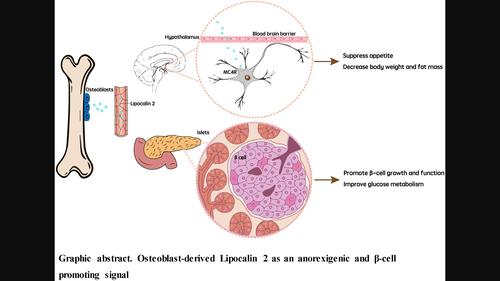当前位置:
X-MOL 学术
›
J. Diabetes
›
论文详情
Our official English website, www.x-mol.net, welcomes your feedback! (Note: you will need to create a separate account there.)
Lipocalin 2—A bone-derived anorexigenic and β-cell promoting signal: From mice to humans
Journal of Diabetes ( IF 4.5 ) Pub Date : 2023-11-30 , DOI: 10.1111/1753-0407.13504 Yuying Yang 1, 2 , Jianmin Liu 1, 2 , Stavroula Kousteni 3
Journal of Diabetes ( IF 4.5 ) Pub Date : 2023-11-30 , DOI: 10.1111/1753-0407.13504 Yuying Yang 1, 2 , Jianmin Liu 1, 2 , Stavroula Kousteni 3
Affiliation

|
The skeleton is traditionally known for its structural support, organ protection, movement, and maintenance of mineral homeostasis. Over the last 10 years, bone has emerged as an endocrine organ with diverse physiological functions. The two key molecules in this context are fibroblast growth factor 23 (FGF23), secreted by osteocytes, and osteocalcin, a hormone produced by osteoblasts. FGF23 affects mineral homeostasis through its actions on the kidneys, and osteocalcin has beneficial effects in improving glucose homeostasis, muscle function, brain development, cognition, and male fertility. In addition, another osteoblast-derived hormone, lipocalin 2 (LCN2) has emerged into the researchers' field of vision. In this review, we mainly focus on LCN2's role in appetite regulation and glucose metabolism and also briefly introduce its effects in other pathophysiological conditions, such as nonalcoholic fatty liver disease, sarcopenic obesity, and cancer-induced cachexia.
中文翻译:

脂质运载蛋白 2——骨源性厌食和 β 细胞促进信号:从小鼠到人类
骨骼传统上以其结构支撑、器官保护、运动和矿物质稳态的维持而闻名。在过去的10年里,骨骼已成为具有多种生理功能的内分泌器官。在这种情况下,两个关键分子是由骨细胞分泌的成纤维细胞生长因子 23 (FGF23) 和骨钙素(一种由成骨细胞产生的激素)。FGF23 通过其对肾脏的作用影响矿物质稳态,骨钙素对改善葡萄糖稳态、肌肉功能、大脑发育、认知和男性生育能力具有有益作用。此外,另一种成骨细胞衍生的激素脂质运载蛋白2(LCN2)也出现在研究人员的视野中。在这篇综述中,我们主要关注LCN2在食欲调节和葡萄糖代谢中的作用,并简要介绍其在其他病理生理状况中的作用,例如非酒精性脂肪肝、肌肉减少性肥胖和癌症引起的恶病质。
更新日期:2023-11-30
中文翻译:

脂质运载蛋白 2——骨源性厌食和 β 细胞促进信号:从小鼠到人类
骨骼传统上以其结构支撑、器官保护、运动和矿物质稳态的维持而闻名。在过去的10年里,骨骼已成为具有多种生理功能的内分泌器官。在这种情况下,两个关键分子是由骨细胞分泌的成纤维细胞生长因子 23 (FGF23) 和骨钙素(一种由成骨细胞产生的激素)。FGF23 通过其对肾脏的作用影响矿物质稳态,骨钙素对改善葡萄糖稳态、肌肉功能、大脑发育、认知和男性生育能力具有有益作用。此外,另一种成骨细胞衍生的激素脂质运载蛋白2(LCN2)也出现在研究人员的视野中。在这篇综述中,我们主要关注LCN2在食欲调节和葡萄糖代谢中的作用,并简要介绍其在其他病理生理状况中的作用,例如非酒精性脂肪肝、肌肉减少性肥胖和癌症引起的恶病质。



























 京公网安备 11010802027423号
京公网安备 11010802027423号